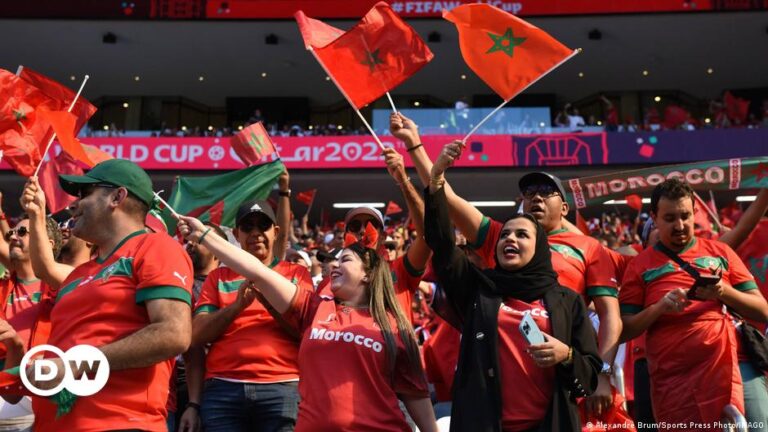When Morocco face Spain for a place in the World Cup quarterfinals on Tuesday, they will be able to count not only on the support of thousands of traveling fans from the north-western tip of Africa, but indeed of millions across the entire continent.
Because, after African champions Senegal were knocked out by England on Sunday, and with Tunisia, Ghana and Cameroon having failed to make it past the group stage, the Atlas Lions are the only African representatives left in Qatar.
“I’m Egyptian but I’m here to support Morocco,” confirms Gamal, a supporter DW encounters at Souq Waqif, one of the most popular convergence points for fans in Doha. “Morocco is the last Arab country left in the competition, and also the last African country.”
Hakim Ziyech, Achraf Hakimi and co have already made history at this tournament, becoming the first African team to win a World Cup group since Nigeria in 1998, ahead of heavyweights Croatia and Belgium.
Now, should they overcome their neighbors from across the Strait of Gibraltar, they would be in with a chance of achieving what Ghana came so close to doing in South Africa in 2010: becoming the first African side to reach a World Cup semifinal.
Like Ghana in South Africa, they have a continent united behind them, despite the significant differences which often divide northern and sub-Saharan Africa.
‘Morocco are playing for all Africans’
When a European country is eliminated from a World Cup, supporters tend to follow the rest of the tournament rather passively, interested more in the overall outcome rather than the fortunes of other European teams. Indeed, they’re more likely to take a greater interest in a side from a different confederation such as Brazil or Argentina.
But not in Africa. While African fans might support their own nation primarily, it’s not uncommon to hear them say they’re supporting all the African teams, even putting aside certain rivalries.
Mahmoud, for example, an Egyptian restaurant owner in Qatar has come to watch Senegal vs. England. And, despite Egypt having lost to Senegal both in the Africa Cup of Nations final and the World Cup qualification playoffs, he’s backing the Lions of Teranga.
“They’re playing for us,” Mahmoud tells DW. “They’re taking to the field for all Africans.”
Soundly beaten by England, Senegal were unable to repeat their exploits of 2002 when they reached the quarterfinal in Japan and South Korea. But, despite the disappointment, the fans now have a new mission.
“Now we’re going to support Morocco until the very end,” insists Bintou, a member of the “12th Gainde,” the colorful Senegalese fan group which translates as “12th player” in Wolof. “All of Senegal, all of Africa, is behind Morocco. They’re our team now and we hope they can reach the final.”
Diplomatic disputes put aside
In the buildup to kick-off against Spain, the atmosphere in the streets of the Souq Waqif will be dominated by Moroccans – but also by Senegalese, Cameroonian, Tunisian and Ghanaian fans still in Qatar, or who are resident here.
Not to mention fans of African nations who didn’t even qualify, and even of Algeria, whose diplomatic relations with Morocco are currently strained over the issue of Western Sahara. While Algeria supports the territory’s desire for independence, Morocco won’t hear of it, and Algerian television often ignores Morocco’s results.
Nevertheless, videos on social media showed Algerians celebrating Morocco’s win over Belgium just as feverishly as the rest of Africa, showing that while states may quarrel, their people are only focused on one thing: seeing Africa shine at the World Cup, regardless which part.
‘Why couldn’t an African team win the World Cup?’
It’s a sentiment felt not only among the supporters, but also among those closer to the action.
“We’re African, too,” declared Walid Regragui, the Morocco head coach, ahead of the final group game against Canada. “And so, like Senegal, like Ghana, like Cameroon and like Tunisia, we want to fly the flag for African football.”
For Regragui, it’s not just about continental solidarity; the Atlas Lions have a sporting point to prove as well.
“African football is often dismissed as mediocre but, at this World Cup, I think we have shown that we can make life difficult for anybody,” he continued.
“We all talk about the European teams, the South American teams, but I hope that, in future, we’ll see more places for African teams. So that, why not? Why couldn’t an African country win the World Cup?”
But first, Africa is still waiting for its first semifinalist. In Qatar, a whole continent is hoping that will be Morocco.
This article was originally written in French and translated by Matt Ford.



